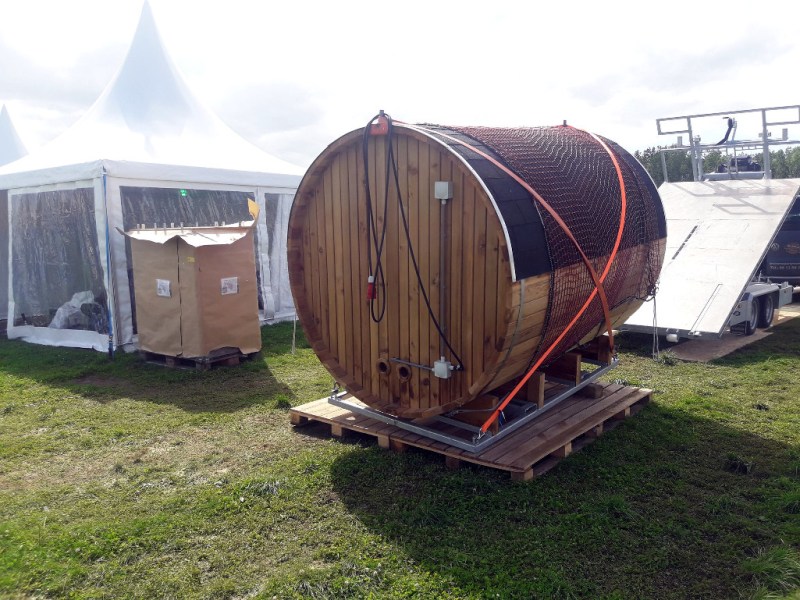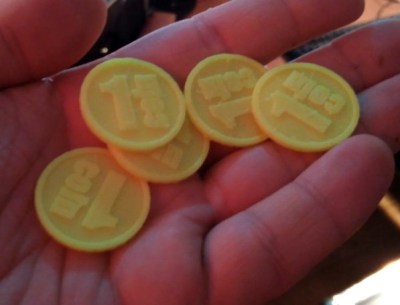If you’ve been to a few hacker camps then you’re aware they are not the products of giant corporate entities but volunteer run community groups. You may even have volunteered yourself, and done all sorts of interesting tasks that go towards the running of the camp. But few of you will have been on the orga team of a camp, the people who put in the hard work of making it happen from start to finish. Julius ter Pelkwijk has, and at the 2018 Electromagnetic Field camp in the UK he gave us an insight into the experience.
Of course, Julius isn’t a member of the EMF orga, instead the camp that gave him the experience was last year’s SHA2017 in the Netherlands. This was over twice the size of EMF 2018, on the Dutch polder at Scoutinglandgoed Zeewolde, a scout camp in a forest next to a dyke, and while from our perspective it was a huge success, it was fascinating to pull back the curtain and hear from the other side of the event.
At the start of the process in early 2016, the volunteer team for SHA2017 was assembled. Effort was organized into 33 teams covering all aspects of the camp. After a trial camping trip they settled upon Scoutinglandgoed Zeewolde as the venue, and then it was time for a ton of legal paperwork. Municipality, venue, vendors, suppliers; it seemed everything called for forms and contracts. There were radio licences and laser show licences. In the Netherlands you need a licence to be a parking marshal on a public road, something which of the 60 volunteers only three people were able to obtain.

Meanwhile another task was ensuring that the global community knew about the event, getting materials to every hacker camp worldwide and ensuring that the ticket sale date was well publicised. As the event started to take shape the physical planning became under way, but there was plenty of last-minute bike-shedding. He gave us an example of the Finnish sauna, which at first was to be a tent but was deemed a safety hazard, then was to be a portable wooden structure that was turned down due to having a charcoal fire (refer to our write-up linked above for an inventive solution to campfire problems), and finally appearing on the site as a rented all-in-one sauna with electric power.

SHA even has its own currency; coins that are purchased at vending machines and used to pay for things like beer and food. The plastic coins were a major headache, with a first supplier canceling 5 days prior to the event because of hacking fears, followed by a last-minute substitution of another supplier. The replacement machines lacked capacity and kept jamming, requiring constant attention from team members.
Having seen the orga team in action at events we can anticipate the next segment, during the event itself they have little time to enjoy it as there is so much work to do. Hackaday got a mention at this point, because during a hastily snatched interview over a beer with your scribe the suggestion was made that sharing the experience with a future camp would be a valuable talk. We’d like to thank Julius for following up on it at EMF.
Afterwards, beyond the several days of clearing the field, there was a long process of administration. Accounting for everything and dealing with paperwork become a large undertaking. Taxes, unsold stock, lost-and-found, and a few speeding tickets. But surprisingly, Julius says he would do it again. We hope if he does that he gets more time to enjoy the event.
Check out his talk below. SHA2017 was an excellent event, and we’ll never make the mistake of taking a great hacker camp for granted!
















And the reason for having their own currency?
Especially a plastic coin at a venue full of hackers and 3-D printers?
Lots of cash tills means more mistakes, fraud and theft.
It’s very useful for limiting the circulation of cash. Instead of 50-100 POS, you have a central converter. Easy to secure, easy to keep it with high quality of service.
Also, it’s incredibly more easy to handle that administratively (taxes, declarations, tracking of incomes/outcomes).
Make your own money has generally strong rules to follow to be legal, but it’s easy.
You’re not solving your problem by minting your own cash. It represents a considerable value at the event and should be treated as such. It wouldn’t be the first time a serious amount of coins is stolen, leading to losses for the organisation.
The tokens are only good for taxation and the rumor was, that this system is mendatory in the Netherlands.
As customer it was just anoying as heck. Machines not working, machines out of coins, machines shut down and no possibility to change from plastic tokens back to sweet Euro afterwards. Way too much trouble for bad coffee, warm booze. Luckily italian ambassy took in regugees ;).
Besides that Sha was great. Especially the food for angels :)
Similar token systems are used at some UK music festivals and amusement parks. Here’s their trick (and I’m not saying this is what SHA were doing – :
* Tokens can be bought in increments of £5 or £10. You can’t buy things with cash at the event – but there will be token dispensers all over.
* Drinks and food prices are set at even prices (£2, £4, £6…) — usually at least £4.
* So if you want a Coke for £4, you pay with a £5 token — and tokens can’t be redeemed for cash — you have a choice: Accept a £1 loss, or buy more. It’s even worse if all you have left is a £10 token, but at least then you can buy food and somehow it comes to £9.50.
* And then the “token cashout” (exchange tokens for cash) is only open for an hour late on the last day, when most people will have already left…
lcm(4,5) is 20 — so you’d have to spend £20 on drinks (five Cokes) to end up breaking even, otherwise you lose varying amounts of change. It gets worse if the items are £6 — then you have to spend £30.
So not only are you being ripped off because of the inflated food and drink prices, you’re being ripped off on no change being given, on the change, and on the cashout (you can put a maximum number on the number of people who can actually cash-out in that hour — even at one-a-minute that’s 60 people in what might be a 6000 person event).
With implementations like this, it’s all extra profit for the event. I’ll reiterate — I’m not accusing SHA of doing this, I’m just saying that this is how some events in the UK abuse tokens to make extra profit.
Having to deal with cash in busy venues is a nightmare (from experience). Keep it simple like 1 drink is 1 token, 1 food item is 2 tokens, luxury food items are 3 tokens, makes dealing with lots of customers fast much much easier. It also leaves vendors way less vulnerable to robbery. Shifting large amounts of tokens is difficult, so robbing or stealing 2000 tokens isn’t going to do you any good. Unfortunately we live in a world where some people WOULD stab someone over 2000 euros. It’s not mandatory by law as such in the Netherlands but many local governments (Dutch: gemeenten) possibly put it as a requirement for getting the event permit. The organisation IS afaik required to provide a convenient means of converting tokens back to cash.
Surely any tax issues are the problem of the vendor. Seems like a lot hassle, especially if the organisers aren’t doing it to rip off more money from the punters.
There are 3 reasons to use tokens over cash:
– Safety
– Theft
– Speed
Tokens don’t represent a value in cash (they represent a product value), so the organizer is not obligated by law to convert them back to cash.
Note for people using 3D printers: Making tokens that look similar to event tokens is a criminal offense (swindling).
Source: https://www.nrc.nl/nieuws/2015/06/05/festivaluta-1502751-a669287